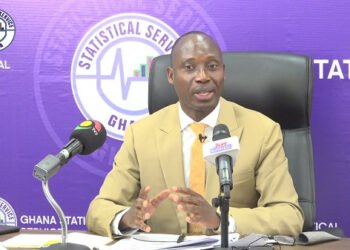A topical research report authored by Dr. Richmond Atuahene, Isaac Kofi Agyei, and K.B Asante has cast doubt on the efficacy of the Bank of Ghana’s (BoG) traditional monetary policy tools in addressing the persistent inflationary pressures faced by the country.
The study suggests that these conventional measures, which were once the cornerstone of Ghana’s inflation-fighting strategy, have experienced diminishing returns, primarily due to the intricate structural dynamics of the Ghanaian economy.
The findings highlight the need for a reevaluation of the country’s approach to monetary policy amid evolving economic dynamics.
“These measures have been excessively utilized in previous years and have become less effective due to the structure of the Ghanaian economy, which has developed a level of resistance to them over time. Addressing Ghana’s economic challenges requires a comprehensive approach that goes beyond relying solely on traditional monetary policy tools like increasing commercial banks’ reserve requirements or adjusting monetary policy rates,” the report asserts.
One key insight from the report echoes earlier observations by Vice President Dr. Bawumia in 2010, linking the high level of reserve requirements – a fundamental monetary policy tool – to a legacy of sustained fiscal deficits. “Bawumia (2010) affirms that the high level of reserve requirements (monetary policy instrument) reflects a legacy of high fiscal deficits,” it added.
Adjusting Monetary Policy Rates
Traditionally, measures such as adjusting monetary policy rates and increasing commercial banks’ reserve requirements have been central to Ghana’s strategy for controlling inflation. However, the study suggests that these tools have reached a point of diminishing returns, largely due to the intricate structural complexities of the Ghanaian economy.
The researchers argue that the overuse of these measures has rendered them less effective over time, as the Ghanaian economy has developed a level of resistance to their impact. They advocate for a shift towards a more comprehensive approach that goes beyond solely relying on traditional monetary policy instruments.
The report’s assertion that Ghana’s economic challenges require a multifaceted response highlights the need for policymakers to explore innovative strategies to address inflationary pressures and promote sustainable economic growth. This could entail greater coordination between monetary and fiscal authorities, as well as the implementation of targeted reforms to enhance the effectiveness of existing policy tools.
The report advocates for significant cuts in government expenditure as a vital step in easing the country’s economic strain. Specifically, it recommends a proactive reduction in central government spending by an additional 30%, with a targeted focus on scaling back flagship programs that have failed to yield substantial economic dividends.
“In summary, the government should refrain from burdening the banks and instead concentrate on making drastic cuts to its excessively large budget. Commercial banks have incurred considerable losses as a result of the DDEP [Domestic Debt Exchange Programme] and are still in the process of recuperating; they should be allowed to fully recover without further burdens!”, the report stated.
As Ghana grapples with inflationary pressures and economic challenges, the findings of this research serve as a stark reminder of the need to recalibrate policy approaches and adopt a more nuanced, multifaceted strategy to foster sustainable economic growth.
As Ghana swims against the economic tides, the findings of this study serve as a timely reminder of the importance of adaptability and innovation in monetary policy formulation. By embracing a more nuanced and holistic approach, policymakers can better equip themselves to address the evolving challenges facing the Ghanaian economy and foster a more stable and prosperous future for all citizens.
READ ALSO: FAO Food Price Index Ticks for the First Time in 7 Months























